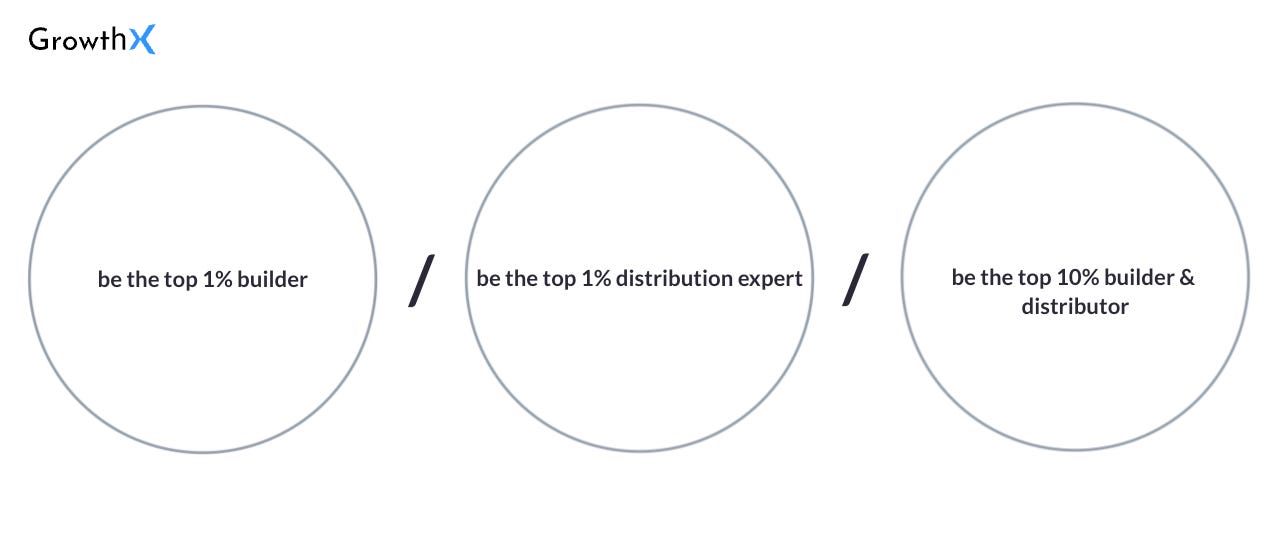How to spend your 20s in the AI era?
An article you will bookmark.
What triggered this topic?
David PAtterson, one of the godfather’s of AI, posted recently “The top AI models are already smarter than 85% of humans….by 2026 99% will”. AI’s effect on your career is real - so the question is “How do you build a bullproof career in AI world?”
“AI is creating fear in the market. Over the last few years, we have had thousands of GrowthX members asking us for advice on how to decide when to quit their jobs, how to pick new roles & truly build a compounding career. A lot of them want either a better job title, salary, work-life balance or just the pure joy of working with smart, ambitious founders.
Not everything in a career is first principles.
If I had to take a pass at this, there are three things in particular. First, the skills you practice. Second, the opportunities you bet on. And, how long do you stay in the bet
But, before I go any further, what’s a career?
At a foundational level, you solve a business problem as an engineer, analyst, product manager, marketer, chief of staff or as a founder/CEO. In a non-political workplace environment, you are rewarded for adding value to the business.
Value creation is nuanced.
Value creation that solves the most important problems in front of the business is rewarded exponentially higher than any other type of value creation.
Take an example of two people working at, say X, a tech company trying to go public. Considering it needs to really nail down profitability - a business leader solving that problem as a whole will be rewarded much higher than someone trying to solve, say just customer acquisition.
Now, that’s core to why I keep pushing operators to solve real northstar problems for your companies. For pre-PMF companies it’s almost always getting to product market fit. For early scaling companies, it’s almost always solving distribution strategy ($$$ sales) while for mature-stage orgs it’s really establishing the business model at scale & solving for revenue growth. And, what’s rewarded changes every single week/month/quarter/year/decade.
Before we go to the 2008 analogy, I need a minute
GrowthX has always been about giving ambitious professionals an edge. Today, that edge gets sharper. The GrowthX membership just got an upgrade. Everything you love stays — The community. The learning. The events.
The members now come with three key upgrades
AI credits, Masterclasses & Meetups.
Take the early 2020s vs the 2008s.
One was at the height of the bull-market vs the latter was extremely bearish. Incentives for companies to be profitable are extremely high in 2023 compared to 2021. And this translates into what behavior is rewarded in most internet companies at a given time.
The point being - understand “those” incentives.
The kind of value creation that’s valued in a product company depends also on the macro context and is not first principles. But, only creating value won’t guarantee a growing career. This is for multiple reasons, some of which are out of your control. I will explain why in a bit. First, I want you to consume the following.
Now, as you can see, for you to get rewarded, you will have to create constant value → impact the business → ensure your outcome is communicated to leadership, in that sequence. This also means if you only deliver the value and do not ensure it’s communicated, you will not reap the rewards, period.
Very few companies in the world have systems built to recognize value creators as a fail-proof mechanism - this is the core reason why I will just work harder and the org should take care of my reward does not work anymore in most orgs you will work for.
Now, you might think over-communicating will help.
It won’t if you plan to build it for the long term unless you are really creating real value for the business that’s mission critical. The whole sequence is important, from creation → impact → communication, and only then capture will happen.
A quick litmus test for you to do right away is to understand how hard it is to grab that appraisal/ promotion at work. If it’s painful process, you either aren’t creating enough value or communicating it or both. Take a minute and think of all the appraisal conversations you ever had in your entire career.
So, what kind of value should you create?
At a foundational level, if you work at a product company (and if you don’t you should), you are either building products/feature or distributing the product or doing both. The rewards for being able to build and distribute are extremely higher than any other role in any 1 → 10 / 11 → 100 organization.
If you are someone who finds joy in building products, get extremely good at it.
You might be a founder, engineer, product manager or even a no-code specialist - get extremely good at building products. Once you are one of the top 10% product builders in an ecosystem, expand your skill set into nailing product distribution. This is vice versa for those who are good at distribution in the first place.
Take a moment, think about all the product builders (engineers/ product managers) you know & what percentage of them are really good at distributing internet products. That number is in lower single-digit percentages, right?
That’s the whitespace to be in.
But, it might not be for everyone, and that’s okay.
You can still build a compounding career by being in the top 1% of either building products or building distribution. Now, you might think I am thrashing the other 99%, but I am not. I am trying to help you get the concept of success density.
You see, most internet products fail and there are only a handful of roles at the companies you will be rewarded for and can take long-term bets on. This means the real opportunity isn’t at the Google/ Microsoft’s of the world.
These opportunities are at tiny startups moving extremely fast with tech. For you to be landing roles at these handful of companies, you will need to be so good that you can’t be ignored. Quick summary of what I covered above.
But, solving for skills is half the story.
The rest is taking the right bets and ensuring you are compounding in that bet. It’s very similar to SIP Mutual funds. The more time you spend in the right bet, the faster you will compound.
For technology companies, owning part of the business is the only way to create wealth. You should be fighting for employee stock options and planning to leave companies that don’t make you part of the wealth creation upside. I will write separately about how to navigate employee stock options (esops) to help you navigate this better. Subscribe to this newsletter if haven’t already.
As exit your early career, taking bets vs random job hopping is critical.
Take the example of two people, A & B. Let’s say “A “switched roles in a 20-year career with an average hike of 15% every year in a technology company. The salary will stagnate because person A is part of an extremely large company and there is little room for creating extremely high value in that role.
While person “B” took a huge risk & took a bet on a technology startup with a tiny chance of success. Person “B” got 20L of stock options at the time of joining.
Let’s take two scenarios, A & B. Scenario A → The startup got a 20X exit/ went public (₹4 Cr assuming no dilution). Scenario B → The startup went bust in the next 4 years (₹0 wealth creation in stock value).
So the equity risk is too much, right? WRONG.
In scenario B, Person B did not get a single penny from their stock options. But, we are missing a point here. Person B got way too many “experiences” of building + distributing products than person A because they worked in a small company.
These experiences will allow them to be extremely valuable for the next company. This is different than doing a process job at a large company. The value creation for you as a team member has no ceiling with those 2 skills.
And the cherry on top - Person B is highly sought after by the large companies Person A works for - interesting, right? This is because most large-scale companies would want builders who could distribute and have the drive for it.
Once you have solved the core skill of building + distributing, you need to own a considerable part of the business you work for, period. This ensures you are really building a large wealth upside that allows you to choose what you do with your time later in life.
Before I end this piece, final thoughts -
Careers are extremely long & fragile. Don’t settle for roles that can offer only a 20/30% hike every year & does not allow you to build experiences that you could learn from across 0 → 1 → 100 growth stage. The past, present and the future will reward the breed of builders who can distribute.









I call this stacking your talents - you creat an n or 1 and the completion for this unique combo is a lot less. Great write up